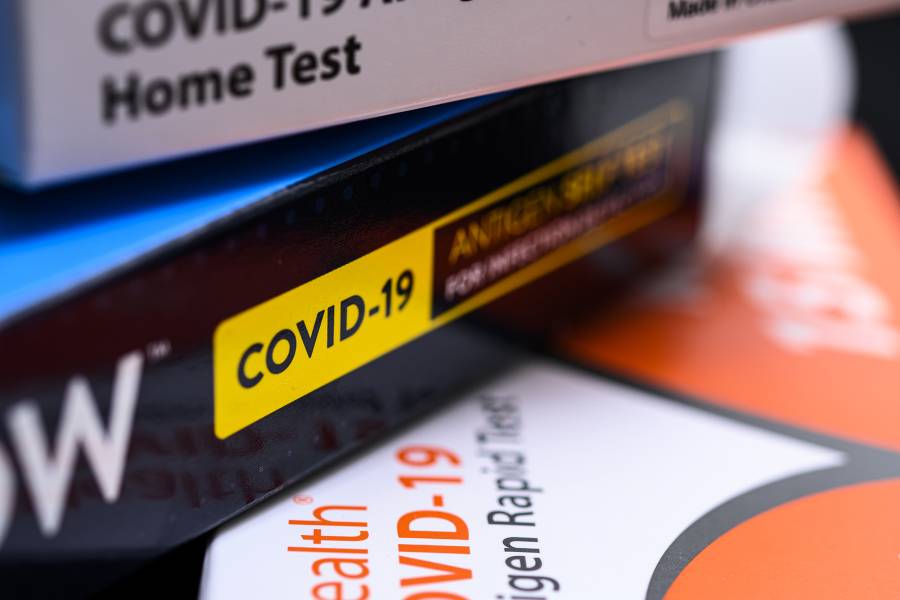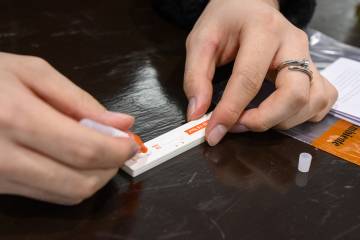Free, rapid at-home COVID-19 test kits will be available to Johns Hopkins University faculty and staff starting Tuesday, Feb. 1, to help ensure a safe transition back to campus when the university returns to its pre-omicron work arrangements on Monday, Feb. 7, university leaders announced today.
Each faculty or staff member or postdoctoral trainee may pick up one free test kit this week between 9:30 a.m. and 3:30 p.m. at select asymptomatic testing sites, including Shriver Hall on the Homewood campus, the School of Nursing's Pinkard Building, and the first floor of the Nitze Building at the School of Advanced International Studies. Beginning Monday, Feb. 7, the kits, which contain two tests each, will be available at Keswick, Mount Washington, Eastern, Carey/Harbor East, Peabody, and the School of Education. Details, including hours of availability, are posted at covidinfo.jhu.edu.
Employees are encouraged to use these tests if they experience COVID-19 symptoms. Those who test positive with a rapid test should begin isolation right away and report the result to the Johns Hopkins COVID call center via online form. Employees who are symptomatic but test negative with a rapid test should still contact the JHCCC and arrange for a test on-campus, which can now be scheduled directly through MyChart. Faculty and staff are also encouraged (but not required) to use a rapid test on completion of five days of isolation following a positive COVID-19 test. Saliva-based PCR testing remains available on demand for all faculty and staff, and employees are encouraged to take advantage of it to guard against asymptomatic spread of the virus.
The availability of free tests was announced in a community message sent Monday afternoon by Laurent Heller, senior vice president for finance and administration; Meredith Stewart, interim vice president for human resources; Stephen Gange, professor and executive vice provost for academic affairs; and Jon Links, professor, vice provost, and chief risk officer. In addition to the free test kits for employees, the university will be distributing approximately 5,000 test kits in Baltimore through partner organizations who have also assisted Hopkins with community food and mask distribution throughout the pandemic.
The message noted that on-campus dining facilities began a phased return to eat-in dining at 50% capacity as of Jan. 31. It also served as a reminder that JHU has changed its on-campus masking requirements: A cloth or surgical mask by itself is no longer acceptable indoors. N95, KN95, KF94, or surgical masks worn under cloth masks are now required, and the masks are now available for free at asymptomatic testing sites. So far, JHU has distributed more than 135,000 masks to the campus community.
Employees were also reminded that the deadline to upload verification that they have met JHU's booster shot requirement is Feb. 1 or as soon as they become eligible, whichever is later. More than 80% of faculty and staff have received and reported their boosters. Those who still need a booster can schedule one at an on-campus clinic or through a local pharmacy or health care provider, and then upload the record to the Vaccine Management System.
Affiliates of the School of Medicine follow Johns Hopkins Medicine's COVID guidelines, and their return to campus date is aligned with JHM's return date this summer. For APL staff members who work, teach, or attend classes at other JHU or JHM campuses, the mandates for each campus apply and can supersede APL guidelines.
Affiliates can still call the JHCCC at 443-287-8500 if they lack internet access or if they have a question or concern on something other than symptoms, such as a possible exposure or vaccination/boosters. Additional details were sent to undergraduate students on Jan. 30, and the community is encouraged to visit covidinfo.jhu.edu for updates.
Posted in Health, University News
Tagged coronavirus, covid-19, covid-19 testing









